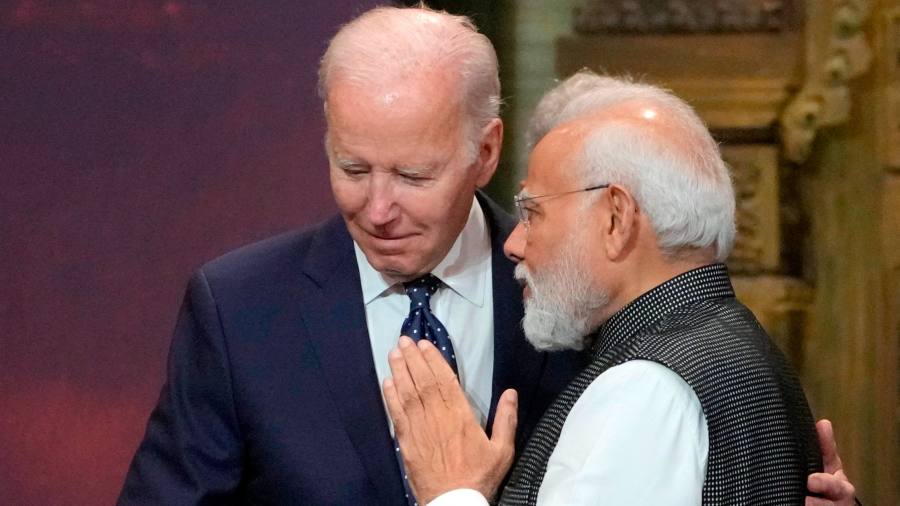“Operation seduce Narendra Modi” is not a new thing. But Joe Biden is taking flattery of India’s prime minister to new levels. Biden’s commerce secretary, Gina Raimondo, recently said Modi’s commitment to India’s people was “just indescribable and deep and passionate and real and authentic”. On Thursday Modi will be one of a select few statesmen — Winston Churchill and Nelson Mandela before him — to address a joint session of Congress more than once. His state dinner will be the glitziest of Biden’s presidency. At this rate India’s leader might get the impression that America quite admires him.
He would get no prizes for guessing why. The thickness of America’s red carpet has nothing to do with Modi’s politics and everything to do with India’s geography. No other country has the size or potential to act as a counterbalance to China. Kurt Campbell, Biden’s Asia adviser, routinely describes US-India as America’s most important bilateral relationship. No caveats are attached to that statement. When pressed on the recent backsliding of India’s liberal democracy, White House officials resort to standard realist disclaimers.
It is true that there is nothing America could do to defend Indian secularism or restore what is left of its independent media. That is a task for Indians, though it seems a far-fetched one at this point. It is also true that US tut-tutting would likely have the opposite to its desired effect. Biden quietly dropped his disapproval of Modi’s UN abstentions over Russia’s war on Ukraine because he was only hardening Indian indifference. Washington now even sees an upside to the surge in India’s Russian oil imports. Though India is helping Vladimir Putin to pay for his war, it also keeps a cap on global oil prices.
Yet the US finds it hard to do foreign policy realism convincingly. Over the next few days, US officials will be unable to stop themselves from saying that India and America share common values, and are the world’s largest and richest democracies respectively. These contestable observations will have nothing to do with the reasons for Modi’s glittering welcome. If Saudi Arabia swapped positions with India, Washington would find it hard to resist praising conservative Islam.
The pity of it is that it is unnecessary. The global star of foreign policy realism is India’s foreign minister, Subrahmanyam Jaishankar, who insists that we live in a multipolar world of “frenemies” — with neither permanent friends nor enemies. This is a variation on aphorisms by Lord Palmerston, Charles De Gaulle and others throughout history. Jaishankar pursues India’s interests with none of the moralist tones of his US counterparts — nor of his cold war predecessors when India was non-aligned. India’s stance on Ukraine is self-interested. Jaishankar does not pretend otherwise.
There are two problems with America’s all-out seduction of Modi. The first is that it gives the lie to Biden’s claim that human rights are “at the heart” of his foreign policy. Modi is trampling on too many rights to mention — religious freedom at the forefront. Yet the US State Department is as quiet about those as it is loud in condemning the transgressions of others in lesser positions on the global chessboard. This can only deepen cynicism about the gap between what America says and does. In an era where the global south is up for grabs, such double standards do little for US credibility.
The risk is that this all-things-China measure produces the opposite of what Biden wants. Most of the world would prefer not to have to make a choice between America and China. The last thing the global south needs is a zero-sum dilemma. As the recurring quip goes, “the Chinese give us an airport; Americans give a lecture”. This looks worse when the moralising is seen as hollow.
The second problem with Biden’s charm offensive is that it misreads how much India needs America. The false impression is that India has all the cards. India is incomparably more vulnerable to Chinese military action than the US. It shares a 2,100-mile border with China, much of it disputed, and its military is no match. In a conflict, only America could bail India out. Though China poses no direct military threat to the US, Washington has convinced itself otherwise.
There is no question that America and India share a realistic fear of an aggressive China. Pulling closer together is the rational thing to do. Behaving like a supplicant to the world’s most ruthless democratic backslider — the strongman who Donald Trump would love to emulate — is both crude and unnecessary. To Modi it will look like a green light.
Read the full article here




